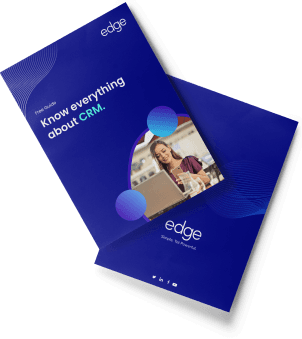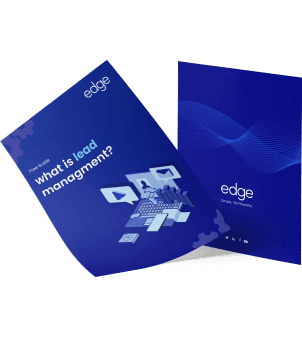Table of Content
Introduction
Understanding What is Marketing CRM
What are the Benefits of CRM Marketing
Four Important Components of CRM Marketing
Six Tips for Effective CRM Marketing Strategy
Five Best Practices for Implementing CRM Marketing
Popular CRM Marketing Tools
Upcoming Future Trends in CRM Marketing
Conclusion
1. Introduction
In the online digital marketing world, finding customers and making your business successful is not so hard. Using the right techniques and tracking your customer behavior and personal experience, you can easily establish your business around the world.
Today, CRM is equivalent to a digital brain for businesses, helping businesses keep track of every interaction they have with their customers. From the moment you first contact a company to every subsequent purchase and beyond, CRM systems gather, organize, and analyze data to foster more robust, meaningful relationships.
CRM marketing assists businesses in building a loyal customer base by directing marketing efforts to individual preferences, behaviors, and needs, resulting in increased customer satisfaction, loyalty, and retention.
According to recent studies, businesses that fully implement CRM strategies experience an average revenue increase of around 41% per salesperson. It witnessed a significant boost in customer satisfaction and retention rates, with up to 74% of customers stating that they are more likely to remain loyal to companies that offer personalized experiences based on their preferences and past interactions.
Amazon, an e-commerce giant, uses a powerful CRM system to track browsing and purchasing history, recommend products, and provide a seamless shopping experience, making it the go-to destination for millions of online shoppers.
In this guide to CRM marketing, we help you explore its benefits, best practices, and how you can improve your business by the right use of CRM. We are about to start on a journey to understand the secrets behind fostering stronger, more profitable customer relationships.
2. What is CRM Marketing?
Having a personal assistant only focused on managing your client is now CRM. One way to increase customer service and promote business growth is by using technology to automate, streamline, and plan technical support, sales, and marketing activities. Digital marketing agencies can leverage CRM tools to enhance customer relationships, optimize campaigns, and drive better engagement.
The days of generic mass marketing are long gone. Today, customers expect personalized experiences according to their needs and preferences. CRM marketing has developed from basic contact management to a highly sophisticated system that analyzes customer data, predicts behavior, and sends targeted messages at the right time and through the proper channels.
CRM systems for marketing work on understanding consumers' needs, maintaining connections, and providing value to the customers. These three fundamental concepts are now applied to the marketing customer relationship management system. The main goals of CRM are to attract new consumers, hold on to current ones, and raise customer lifetime value by offering outstanding service and individualized attention. CRM marketing does not use traditional marketing methods that depend on mass advertising and one-size-fits-all messages; instead, it concentrates on building customer relationships.
3. What are the Benefits of CRM Marketing?
In 2024, you will already know the benefits of CRM implementation in your business. So many companies are now ruling the internet because of robust CRM systems. It focuses on how to care for customer needs and provide a better solution at the right time.
Improving client retention and loyalty
CRM marketing allows organizations to develop robust and long-term customer relationships by understanding their requirements and preferences. Businesses may encourage client loyalty and keep them returning for more by providing fit experiences and targeted incentives.
Increasing customer satisfaction and engagement
CRM Marketing allows firms to better predict and respond to client demands, increasing satisfaction. Businesses may boost customer engagement and pleasant experiences at all touchpoints by providing timely help, appropriate information, and tailored communication.
Increasing profitability and revenue
One of the primary goals of CRM marketing is to drive revenue growth. Businesses can maximize profitability and increase their bottom line by identifying high-value customers, upselling or cross-selling products and services, and reducing customer churn.
Gaining a competitive advantage in the market
In today's competitive landscape, customer experience is a key differentiator. CRM Marketing differentiates businesses by delivering exceptional service and tailored experiences. By leveraging customer data and insights, companies can stay ahead of the competition and win market share.
So, whether you want to build stronger relationships with your customers or not, choose our Edge CRM systems for Marketing to help you grow your business.
4. Four Important Components of CRM Marketing
Four important components of CRM with marketing that basically work for your business growth. It involves Customer Data Management, Customer Segmentation, Personalization, and Automation. These four pillars of CRM marketing help reach customers and stay in contact with them. Let's understand each component of CRM in detail.
Customer Data Management
The basis of any successful CRM marketing campaign is customer data. You can quickly gain valuable knowledge about your customers' behaviors, preferences, and needs by collecting and organizing data from various sources, including online interactions, purchase history, feedback, and social media. Your company can better use this data to understand your target market's demographics, interests, and brand engagement. Businesses that need accurate and organized data run the risk of making uninformed decisions and sending out irrelevant marketing messages, which can harm customer relationships and overall business performance.
You have well-defined data collection processes across multiple touchpoints, maintaining data consistency and accuracy.Adopting a robust CRM systems for marketing helps businesses to centralize customer data, making it more accessible and actionable for marketing teams. Regular data matching and cleansing are required to maintain quality and relevance over time.
Customer Segmentation
Customer segmentation breaks the customer base into discrete groups according to shared traits, habits, or inclinations. Companies that use segmentation are better able to understand their client base's various needs and preferences and customize marketing strategies for each group. Standard segmentation criteria are demographics (age, gender, location), psychographics (lifestyle, values, interests), and behavioral data (purchase history, engagement level).
Once customer segments are identified, you can develop targeted marketing campaigns and messaging tailored to the unique characteristics of each segment. For example, a clothing retailer may create separate campaigns for different age groups or make personalized recommendations based on past purchase behavior. Businesses can boost engagement, increase conversion rates, and strengthen customer relationships by providing relevant and customized content to each segment.
Personalization
Giving customers relevant and meaningful experiences is all about developing a feeling of personalization. Today, customers expect brands to understand their unique preferences and provide personalized interactions across all touchpoints. Personalized marketing improves customer engagement and loyalty while increasing conversion rates and revenue. According to studies, customized emails have higher open and click-through rates than generic emails, highlighting the importance of personalization in marketing efforts.
Read More: A Complete Guide For "Lead Management"
To give customers individualized experiences, you have to employ various strategies. Among them are the use of dynamic content and recommendations for products based on past interactions, addressing clients by name in correspondence, and customizing deals and promotions to fit their preferences. Additionally, you can use data-driven personalization tools and algorithms to automate the delivery of personalized content and recommendations across multiple channels, such as email, website, and social media.
Automation
To help businesses run more smoothly and profitably, marketing automation uses technology to automate mundane tasks and optimize marketing procedures. You can save time and money while maintaining consistency and scalability in your marketing efforts by automating email marketing, lead nurturing, and campaign management tasks. Your business can also increase engagement and conversion rates by using automation to send customers timely and relevant messages based on their behaviors and interactions.
Businesses can support their marketing automation efforts with various features and functionalities offered by many CRM automation tools and platforms. Some popular CRM automation tools include Edge CRM, HubSpot Marketing Automation, and Marketo. These platforms offer email automation, lead scoring, workflow automation, and personalized messaging, empowering businesses to automate various aspects of their marketing campaigns and drive better results.
Everything provides a personal touch experience to the client, from data collection to automation. Each component of CRM marketing is important to making your business successful.
5. Six Tips for Effective CRM Marketing Strategy
Creating an effective marketing strategy is only a cup of tea for some; you must have a perfect understanding of business and marketing. Principles. Building a CRM with a marketing plan that works requires careful consideration of the market and analysis of customer data.
By routinely reviewing and adapting your approach based on performance measures, you can help achieve long-term success.
Set clear objectives and goals:
Give your CRM marketing efforts a clear definition of your objectives. Are you looking to increase customer retention, boost sales, improve customer satisfaction, or achieve another specific goal? Setting clear objectives helps provide direction and ensure that everyone involved understands your CRM marketing strategy's purpose and desired outcomes.
Develop a customer-focused culture:
Build an organizational mindset where putting customers at the forefront is prioritized. Workers in every department should be urged to actively listen to what customers say, respond to their needs right away, and work to go above and beyond what they expect. When employees understand the importance of delivering exceptional customer experiences, it fosters a culture of empathy, responsiveness, and commitment to customer satisfaction.
Keep an eye on customer data:
Regularly monitor and analyze customer data to uncover insights into their behaviors, preferences, and purchasing patterns. By leveraging data analytics tools and CRM systems, you can identify trends, segment your customer base effectively, and personalize marketing campaigns to resonate with different customer segments. Continuously updating and refining your understanding of customer data ensures that your CRM marketing efforts remain relevant and responsive to changing customer needs.
Connect CRM marketing with other parts of your business:
Break down silos between departments by integrating CRM marketing with other vital functions such as sales, customer service, and product development. Sharing customer insights and data across departments enables a holistic view of the customer journey and facilitates coordinated efforts to deliver seamless, personalized experiences. Aligning CRM with marketing broader business objectives helps maximize the impact of your efforts and ensures consistency in messaging and customer interactions across touchpoints.
Keep refining your strategies:
Stay agile and adaptable by regularly evaluating the effectiveness of your CRM and marketing strategies and making adjustments as needed. Solicit customer feedback through surveys, social media channels, and other feedback mechanisms to gain valuable insights into their satisfaction levels and preferences. Use this feedback to fine-tune your strategies, experiment with new approaches, and innovate to meet your customers' evolving needs and expectations. Continuous improvement and refinement of your CRM marketing strategies are essential for staying competitive and driving long-term success.
Read More: What is Smarketing: The ideology, perks and steps!
You can improve client relationships, drive business expansion, and more effectively and efficiently accomplish your organization's goals by implementing these comprehensive pointers for CRM marketing.
6. Five Best Practices for Implementing CRM Marketing
Five simple but most important techniques help you to improve your business flow:
Building strong customer relationships through communication:
Maintain open and transparent communication with your customers. Regularly engage with them through personalized messages, emails, and social media interactions. Listen to their feedback, solve their concerns promptly, and show appreciation for their loyalty. Building strong relationships based on trust and communication lays the foundation for long-term customer loyalty and advocacy.
Combining technology for smooth customer interactions:
Invest in the right CRM technology for smooth communications through multiple channels. Install tools and platforms that support multichannel communication, allowing customers to interact with your brand through their preferred channels. Use automation and artificial intelligence to streamline processes, personalize interactions, and send timely and relevant messages to customers at all stages of their journey.
Providing excellent customer service at all touchpoints:
Deliver exceptional customer service consistently across all touchpoints. Train your customer service representatives to be knowledgeable, empathetic, and responsive to customer needs. Empower them with the tools and authority to resolve issues quickly and effectively. By prioritizing customer satisfaction and delighting customers with outstanding service, you can turn them into loyal advocates for your brand.
Measuring and calculating the success of CRM marketing initiatives:
Define key performance indicators (KPIs) to measure the effectiveness of your CRM marketing initiatives. Track metrics such as customer acquisition costs, customer lifetime value, retention rates, and satisfaction scores to gauge the impact of your efforts. Regularly analyze data and performance metrics to identify areas for improvement and optimize your CRM and marketing strategies for better results.
Training and empowering employees to utilize CRM tools effectively:
Provide comprehensive training and support to employees on effectively using CRM tools and platforms. Ensure they know the importance of precise data entry, appropriate utilization of CRM functionalities, and compliance with company guidelines and protocols. Give staff members the knowledge and tools they need to properly use the right CRM technology to increase customer engagement and deliver individualized experiences.
This simple technique can increase customer satisfaction, sales, and overall business performance.
7. Popular CRM Marketing Tools
There are three types of business marketing tools we are asking you to implement in your business to see drastic changes in business growth. Here, we talk about marketing customer relationship management tools, marketing automation tools, analytics, and reporting solutions. This whole system helps to improve business statistics, provides a great repository, and helps in marketing.
Customer Relationship Management (CRM) Software
Leading CRM platforms such as Salesforce, HubSpot, and Edge CRM can help your business manage marketing customer relationships and advance marketing initiatives. Salesforce is known for its robust features and scalability, catering to businesses of all sizes.
HubSpot provides an all-in-one platform with CRM, marketing, sales, and service tools, making it ideal for inbound marketing strategies. Edge CRM offers a suite of applications tailored to specific industries, allowing customized solutions to meet various business requirements.
When selecting a CRM system, look for capabilities that enable basic CRM marketing functions such as contact management, lead tracking, email marketing, and customer segmentation. To make your CRM initiatives more effective, you need connections with other platforms and tools, flexible processes, mobile accessibility, and powerful analytics and reporting features.
Marketing Automation Tools
Marketo, Pardot, and Mailchimp are marketing automation software. This software reduces processes, automates tasks, and delivers custom experiences, including lead management, email marketing, and campaign orchestration. Pardot, part of the Salesforce ecosystem, specializes in B2B marketing automation with lead generation, nurturing, and scoring features. Mailchimp is famous for its user-friendly interface and robust email marketing automation capabilities, making it suitable for businesses of all sizes.
Marketing automation supplements CRM efforts by automating tasks such as lead nurturing, email marketing, and campaign management, allowing marketing teams to focus on strategy and creative initiatives. Marketing automation and CRM systems can simplify business processes, lead management, and personalized campaigns by streamlining processes and utilizing customer data.
Analytics and reporting solutions
Analytics are necessary for CRM and marketing since they provide insights into customer behavior, campaign performance, and marketing effectiveness, allowing firms to discover patterns, quantify the impact, and optimize strategies.
Analytics solutions like Google Analytics and Adobe Analytics and CRM platforms like Salesforce and HubSpot provide detailed information about campaign performance, user behavior, conversion rates, and marketing efficacy.
CRM Businesses can use marketing technologies like CRM software, marketing automation platforms, and analytics solutions to streamline their marketing operations, boost customer interaction, and generate better outcomes. Whether maintaining client interactions, automating marketing duties, or monitoring campaign results, these tools provide the capability and flexibility required.
8. Upcoming Future Trends in CRM Marketing
AI and machine learning algorithms can transform marketing customer relationship management by analyzing large amounts of data, automating lead scoring, and providing personalized experiences that improve customer understanding and satisfaction.
Predictive analytics forecasts future customer behavior using historical data and AI algorithms, allowing firms to spot opportunities, handle complaints, and personalize marketing campaigns to remain competitive and provide timely services.
Omnichannel marketing is expected to grow as businesses provide seamless experiences across various channels, focusing on personalized interactions and unified consumer profiles to track engagements and messaging. As technology advances in CRM and Marketing, companies will focus on emotional intelligence and human-centric strategies to build stronger customer connections, brand loyalty, and empathy.
9. Conclusion
This comprehensive CRM marketing guide covers the fundamentals, benefits, components, strategies, tools, and future trends shaping marketing customer relationship management. Businesses in today's digital age have many opportunities to improve their marketing efforts and drive success, from understanding the importance of building strong customer relationships to using technology for smooth interactions and accepting emerging trends like AI and predictive analytics.
We provide a comprehensive guide to improving your business. Still, if you need clarification or have any queries, contact our support team to answer them.













